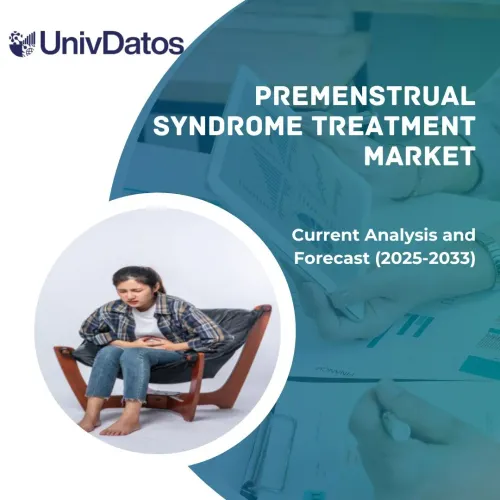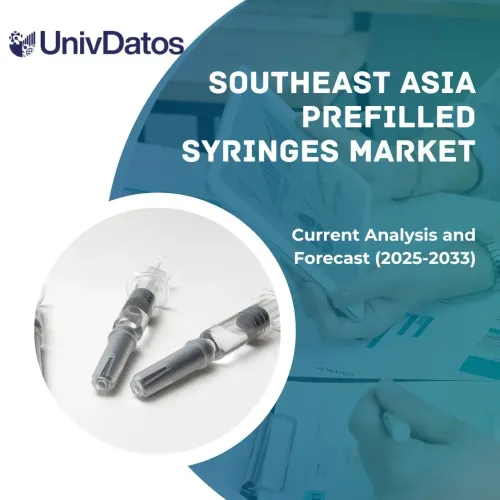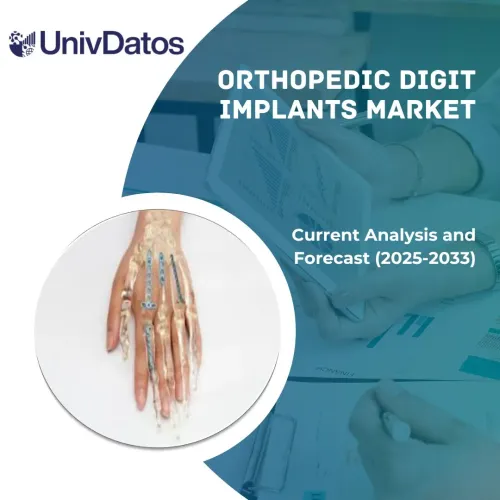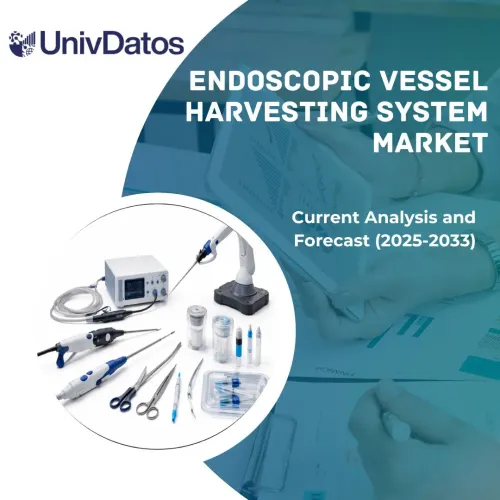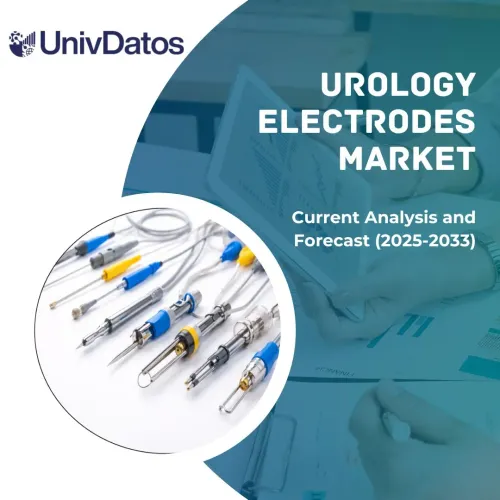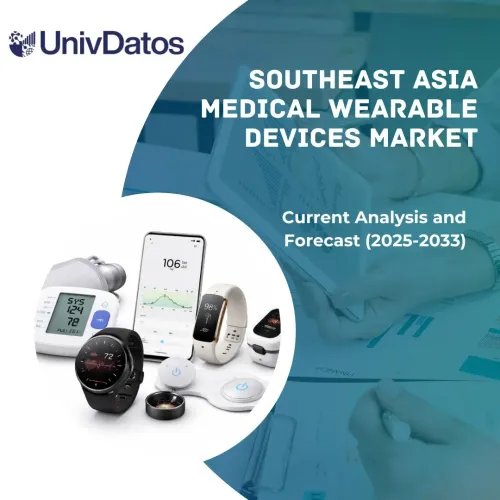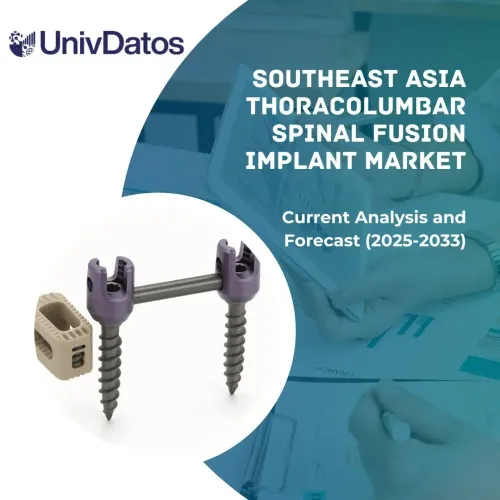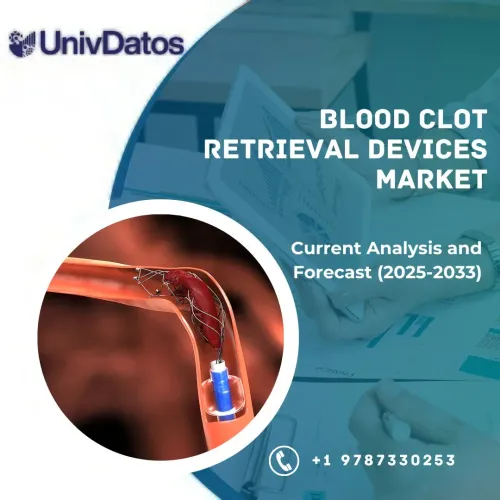- Home
- About Us
- Industry
- Services
- Reading
- Contact Us
Medical Tourism Market: Current Analysis and Forecast (2025-2033)
Emphasis on Treatment Type (Cancer Treatment, Orthopedic Treatment, Fertility Treatment, Cardiovascular Treatment, Neurological Treatment, Others); Region/Country
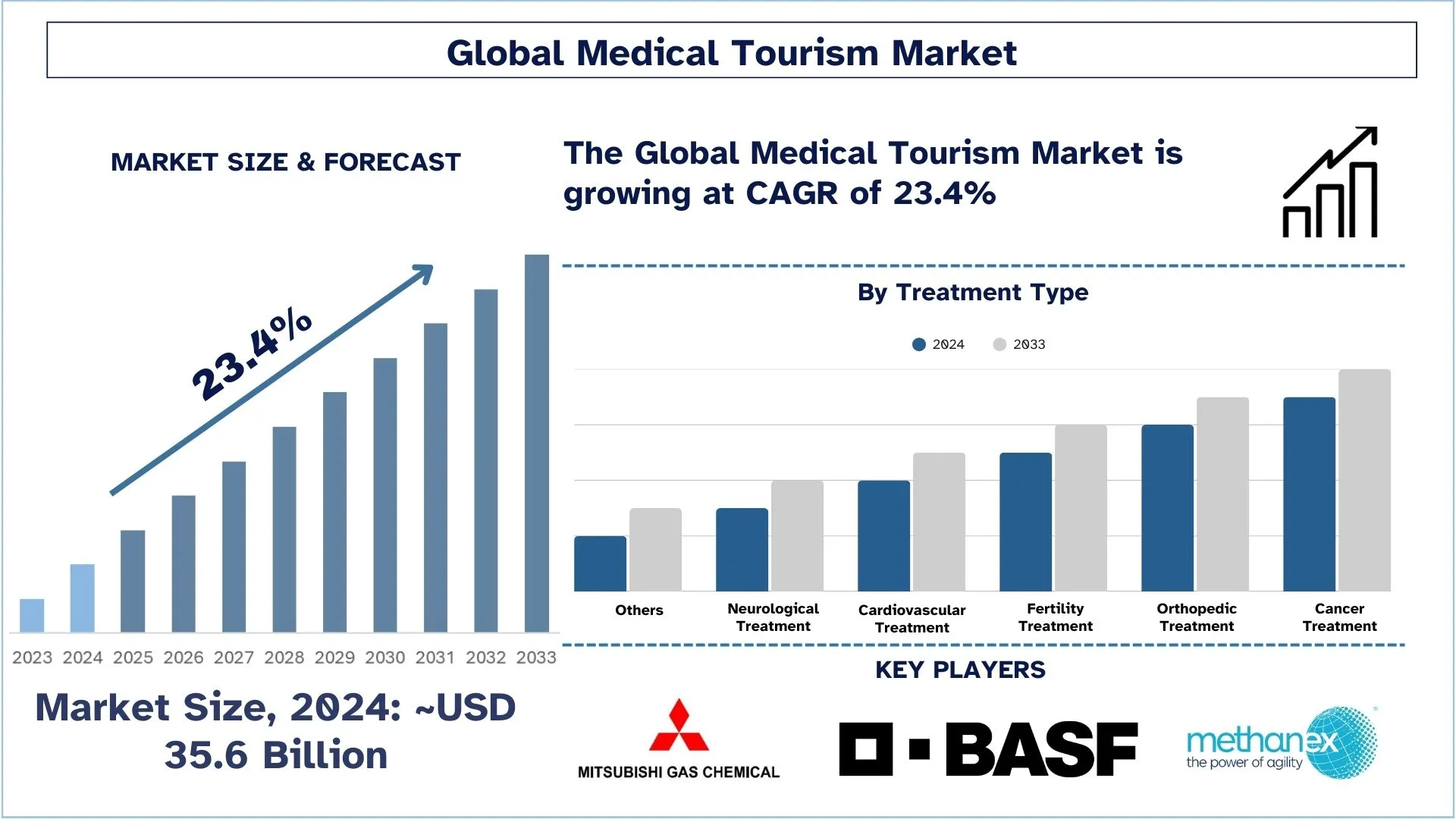
Medical Tourism Market Size & Forecast
The medical tourism market was valued at approximately USD 35.6 billion in 2024 and is expected to grow at a substantial CAGR of around 23.4% during the forecast period (2025-2033), owing to the rising disposable incomes, increased healthcare needs, and technological advancements.
Medical Tourism Market Analysis
The international travel in search of medical treatment is gradually increasing because of rising costs of health care in developed countries, lengthy turnaround time for some treatments, and accessibility of technological equipment in the growing economies. People have opted for medical tourism to get the best medical services that are cheaper as compared to those in their home countries in destinations such as Thailand, India, and Mexico. The market encompasses a wide range of services, from elective surgeries and dental procedures to fertility treatments and wellness therapies. This is in line with the current general global trend of customers seeking affordable and more efficient healthcare solutions.
Medical Tourism Market Trends
This section discusses the key market trends influencing the various segments of the Medical Tourism market as identified by our research experts.
Integration of Digital Health Technologies
One of the increasingly emerging phenomena in the medical tourism context is the use of technologies in information and communication around such services as telemedicine, electronic health records, and virtual consultations. These advancements enrich the patient’s experience with organization and availability of pre-travel consultations, better coordination, and information exchange between the patient and carer. The use of digital media not only makes the medical tourism processes easier but also offers confidence and consistency, making it an essential tool for the progress of industry.
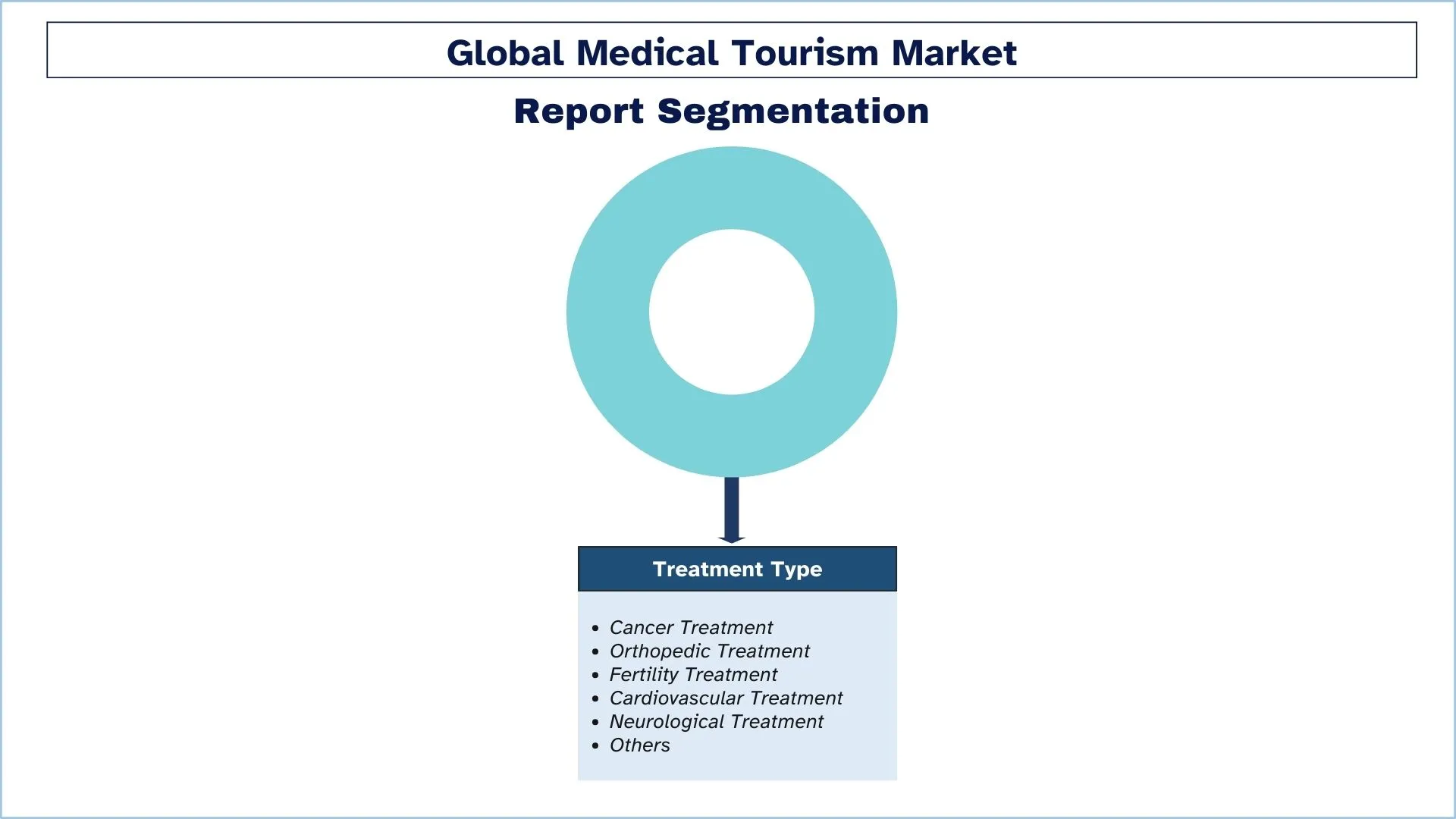
Medical Tourism Industry Segmentation
This section provides an analysis of the key trends in each segment of the global medical tourism report, along with forecasts at the global, regional, and country levels for 2025-2033.
The Cancer Treatment Market Holds the Largest Share of the Medical Tourism Market.
Based on treatment type, the market is categorized into cancer treatment, orthopedic treatment, fertility treatment, cardiovascular treatment, neurological treatment, and others. The cancer treatment market dominated the industry by offering advanced therapies like immunotherapy, proton therapy, and precision medicine at lower costs abroad. Patients seek high-quality care, shorter waiting times, and access to cutting-edge technologies unavailable or unaffordable in their home countries, making oncology a key growth driver.
North America has a significant share of the market in 2024.
The health tourism industry in North America has steadily grown since many patients cannot afford the expensive services offered in the region. Many people are going to other states like Mexico and Costa Rica because procedures are much cheaper than in the United States and Canada. Accordingly, there is a high demand for dental services, cosmetic surgeries, and any surgeries that are not necessarily urgent. Also, there is an indication that medical tourism is on the rise; people from other countries are coming into North America for specialized treatment and quality health care.
U.S. Dominates the North American Medical Tourism Market
The medical tourism in the United States can be further classified as both outgoing and incoming medical tourism. Locally, Americans opt to seek medical services in other countries since healthcare rates are relatively high, and insurance providers do not cover some procedures. On the other hand, the U.S. is sought by international patients due to well-developed health facilities, effective treatments for different complications, and qualified health care providers. The market is further supported by joint efforts of healthcare providers and travel agents who provide systematic packages for medical treatment and travelling, as well as accommodations.
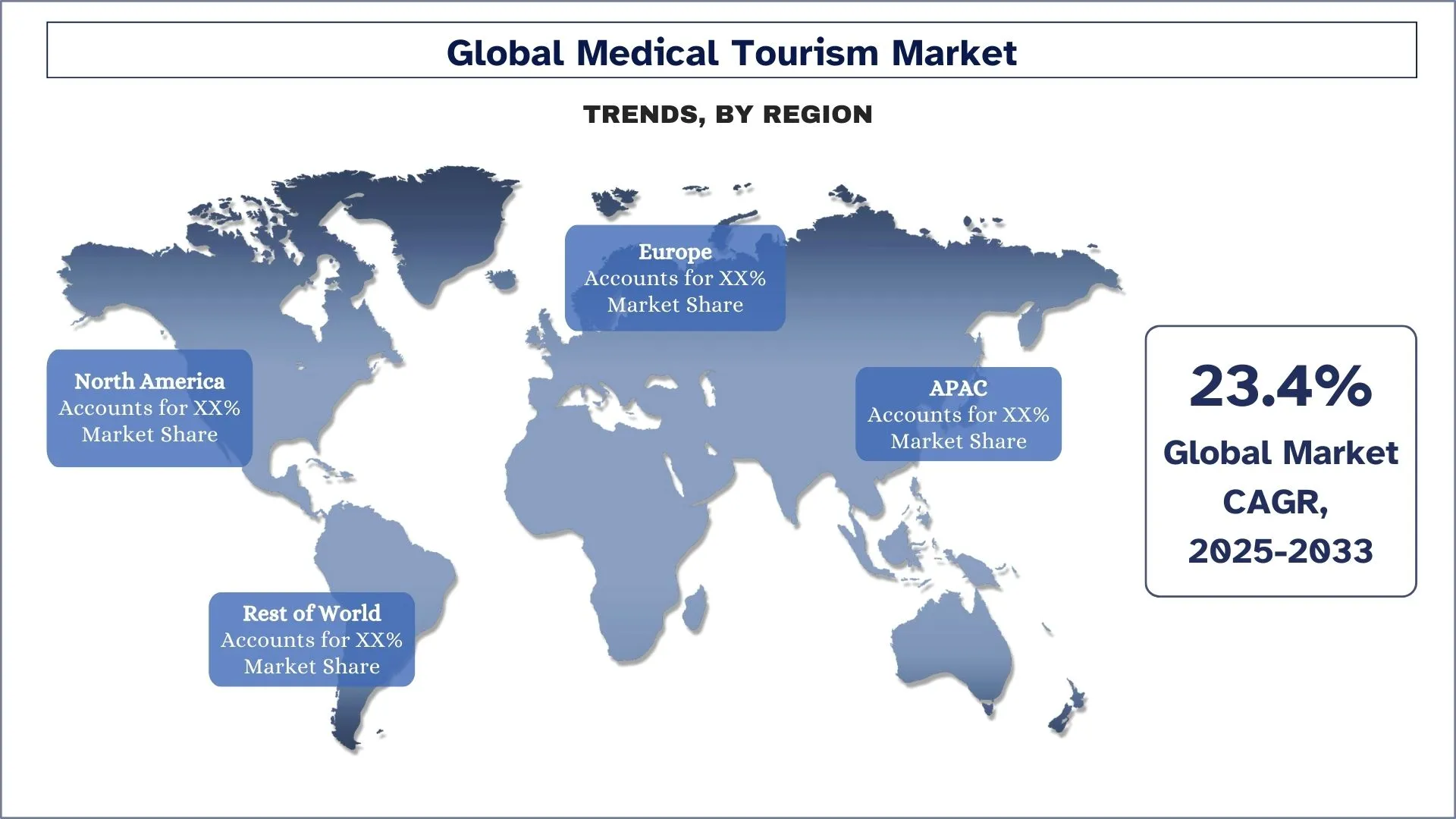
Medical Tourism Industry Competitive Landscape
The medical tourism market is competitive, with several global and international players. The key players are adopting different growth strategies to enhance their market presence, such as partnerships, agreements, collaborations, new product launches, geographical expansions, and mergers and acquisitions.
Top Medical Tourism Companies
Some of the major players operating in the market are Apollo Hospitals, Fortis Healthcare (IHH Healthcare), Asian Heart Institute, Kpj Healthcare Berhad (Aqar Healthcare REIT), NTT Medical Center Tokyo, Seoul National University Hospital, Uz Leuven, Wooridul Spine Hospital, ADITYA BIRLA HEALTH SERVICES LTD., and BARBADOSIVF.COM
Recent Developments in the Medical Tourism Market
In January 2024, Ferns N Petals launched a medical tourism venture named MediJourney, which will provide a comprehensive range of healthcare services across over 30 treatment segments, including cardiology and oncology. This initiative aims to streamline medical travel processes and enhance patient care
In October 2022, Fortis Healthcare (IHH Healthcare) opened a 200-bed multi-specialty hospital in Greater Noida. Fortis Healthcare (IHH Healthcare)'s newest facility is near Jewar's new airport, which is expected to increase the number of patients seeking cross-border care services.
Medical Tourism Market Report Coverage
Details | |
Base year | 2024 |
Forecast period | 2025-2033 |
Growth momentum | Accelerate at a CAGR of 23.4% |
Market size 2024 | USD 35.6 Billion |
Regional analysis | North America, Europe, Asia-Pacific, Rest of the World |
Major contributing region | North America is expected to grow at the highest CAGR during the forecasted period. |
Key countries covered | U.S., Canada, Germany, France, UK, Spain, Italy, China, Japan, and India |
Apollo Hospitals, Fortis Healthcare (IHH Healthcare), Asian Heart Institute, Kpj Healthcare Berhad (Aqar Healthcare REIT), NTT Medical Center Tokyo, Seoul National University Hospital, Uz Leuven, Wooridul Spine Hospital, ADITYA BIRLA HEALTH SERVICES LTD., and BARBADOSIVF.COM | |
Report Scope | Market Trends, Drivers, and Restraints; Revenue Estimation and Forecast; Segmentation Analysis; Demand and Supply Side Analysis; Competitive Landscape; Company Profiling |
Segments Covered | By Treatment Type, By Region/Country |
Reasons to Buy the Medical Tourism Market Report:
The study includes market sizing and forecasting analysis validated by authenticated key industry experts.
The report presents a quick review of overall industry performance at a glance.
The report covers an in-depth analysis of prominent industry peers with a primary focus on key business financials, product portfolios, expansion strategies, and recent developments.
Detailed examination of drivers, restraints, key trends, and opportunities prevailing in the industry.
The study comprehensively covers the market across different segments.
Deep dive regional-level analysis of the industry.
Customization Options:
The global medical tourism market can be customized further as per the requirements or any other market segment. Besides this, UnivDatos understands that you may have your own business needs; hence, feel free to contact us to get a report that completely suits your requirements.
Table of Content
Research Methodology for Medical Tourism Market Analysis (2023-2033)
We analyzed the historical market, estimated the current market, and forecasted the future market of the global medical tourism market to assess its application in major regions worldwide. We conducted exhaustive secondary research to gather historical market data and estimate the current market size. To validate these insights, we carefully reviewed numerous findings and assumptions. Additionally, we conducted in-depth primary interviews with industry experts across the Medical Tourism value chain. After validating market figures through these interviews, we used top-down and bottom-up approaches to forecast the overall market size. We then employed market breakdown and data triangulation methods to estimate and analyze the market size of industry segments and sub-segments.
Market Engineering
We employed data triangulation techniques to finalize the overall market estimation and derive precise statistical numbers for each segment and sub-segment of the global medical tourism market. We split the data into several segments and sub-segments by analyzing various parameters and trends, including treatment type and regions within the global Medical Tourism Market.
The main objective of the Global Medical Tourism Market Study is to
The study identifies current and future trends in the global Medical Tourism market, providing strategic insights for investors. It highlights regional market attractiveness, enabling industry participants to tap into untapped markets and gain a first-mover advantage. Other quantitative goals of the studies include:
Market Size Analysis: Assess the current and forecast market size of the global medical tourism market and its segments in terms of value (USD).
Medical Tourism Market Segmentation: The study segments the market by treatment type and region.
Regulatory Framework & Value Chain Analysis: Examine the regulatory framework, value chain, customer behavior, and competitive landscape of the Medical Tourism industry.
Regional Analysis: Conduct a detailed regional analysis for key areas such as Asia Pacific, Europe, North America, and the Rest of the World.
Company Profiles & Growth Strategies: Company profiles of the medical tourism market and the growth strategies adopted by the market leaders to sustain the fast-growing market.
Frequently Asked Questions FAQs
Q1: What is the medical tourism market's current size and growth potential?
The global medical tourism market is valued at approximately USD 35.6 billion in 2024 and is projected to grow at a robust CAGR of 23.4% through 2033.
Q2: What are the driving factors for the growth of the medical tourism market?
Rising healthcare costs and long wait times in developed countries are pushing patients to seek affordable and timely treatments abroad.
Q3: Which market has the largest share of the medical tourism market by treatment type?
The cancer treatment category currently holds the largest market share.
Q4: What are the major trends in the medical tourism market?
The integration of telemedicine and digital platforms is streamlining pre- and post-treatment care for international patients.
Q5: Which region will dominate the medical tourism market?
The North America region currently dominates the global Medical Tourism market.
Q6: What are the biggest challenges in the medical tourism market?
Regulatory differences, visa restrictions, and concerns about post-operative care quality remain key barriers to growth.
Q7: Who are the Top players in the global medical tourism market?
The leading companies driving innovation in medical tourism include:
• Apollo Hospitals
• Fortis Healthcare (IHH Healthcare)
• Asian Heart Institute
• Kpj Healthcare Berhad (Aqar Healthcare REIT)
• NTT Medical Center Tokyo
• Seoul National University Hospital
• Uz Leuven
• Wooridul Spine Hospital
• ADITYA BIRLA HEALTH SERVICES LTD.
• BARBADOSIVF.COM
Q8: Why is cancer treatment a key driver of the medical tourism market?
Cancer treatment is a major driver due to the availability of advanced therapies, lower costs, and faster access to care in medical tourism destinations, attracting patients seeking affordable and timely oncology solutions.
Q9: Which countries are leading destinations in the medical tourism industry?
Countries like India, Thailand, Mexico, and Turkey lead the medical tourism market by offering high-quality care, specialized treatments, and competitive pricing for international patients.
Related Reports
Customers who bought this item also bought


